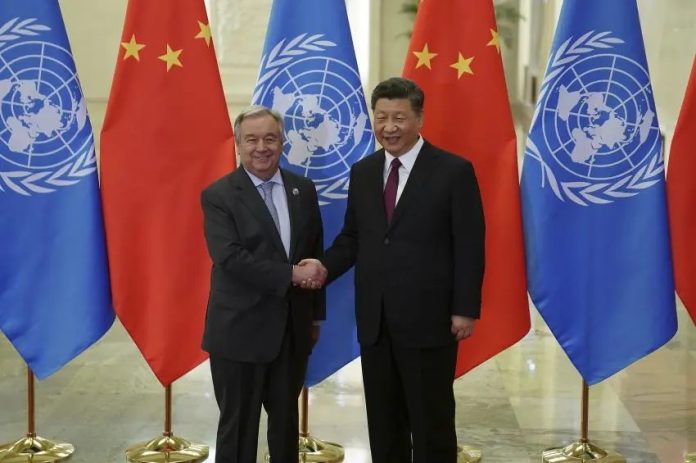(New York) – United Nations Secretary-General António Guterres should press Chinese President Xi Jinping to end Chinese authorities’ crimes against humanity in Xinjiang and other serious rights abuses in China during his upcoming visit, Human Rights Watch said today.
Guterres is expected to attend the third Belt and Road Forum in Beijing on October 17 and 18, 2023, to mark the 10th anniversary of China’s global infrastructure initiative. Since becoming secretary-general in 2017, Guterres has shown reluctance to publicly criticize the Chinese government for its severe and worsening repression.
“UN Secretary-General Guterres has failed to take meaningful action to press the Chinese government to end its crimes against humanity in Xinjiang,” said Tirana Hassan, executive director at Human Rights Watch. “The Belt and Road Forum provides Guterres with an important opportunity to endorse principles central to the United Nations.”
In August 2022, the UN human rights office issued a damning report confirming allegations of mass detention, torture, cultural persecution, forced labor, and other serious rights violations against Uyghurs and other Turkic Muslim communities in Xinjiang. The report concluded that the Xinjiang abuses “may constitute … crimes against humanity.” Guterres’ spokesman said at the time that the report “clearly identifies serious human rights violations in the Xinjiang region of China” and urged China to “take on board” its recommendations.
In recent years, some Belt and Road Initiative projects never conducted nor disclosed adequate environmental and social impact assessments, or sufficiently consulted local communities affected by project planning and construction, prompting widespread protests. They have also drawn criticism for facilitating corruption, nontransparent loan agreements, and noncompetitive contracts that require the use of Chinese companies.
Several Belt and Road Initiative recipient countries such as Djibouti, Pakistan, and the Maldives, are at high risk of debt distress. Limited government resources may potentially be diverted away from essential services to debt servicing.
Such practices are inconsistent with basic obligations of states under international human rights law concerning a healthy and sustainable environment, which the secretary-general has made a top priority.
Guterres should also use his meetings with senior Chinese officials to press for the release of people arbitrarily detained. They include a prominent Uyghur anthropologist, Dr. Rahile Dawut, who was reportedly sentenced to life in prison for a trumped-up and unspecified “state security” crime; and the Uyghur economist and Sakharov Prize winner, Ilham Tohti, who is serving a life sentence for “separatism” for promoting dialogue between Uyghurs and Han Chinese.
Guterres should also work with the UN High Commissioner for Human Rights, Volker Türk, to ensure that there is follow-up to the 2022 Xinjiang report, including continued gathering of evidence of serious abuses and reporting to member states. While the UN human rights office is independent, the UN’s human rights messaging is strongest when the high commissioner and secretary-general reinforce each other’s public statements.
The secretary-general should press the Chinese government to provide greater transparency in all of China’s Belt and Road Initiative projects, and emphasize the need to rapidly shift investments and projects away from fossil fuels to green renewable sources of energy, Human Rights Watch said.
“Secretary-General Guterres needs to be unequivocal in standing for human rights and upholding the UN’s responsibilities,” Hassan said. “China not only is responsible for grave human rights violations on a massive scale but has also sought to undermine the UN’s global human rights system.”

































